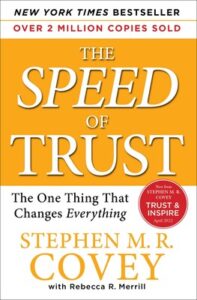Behavior #10: Practice Accountability, page 200.
Summary: Behavior #10 – Practice Accountability
- Hold yourself accountable.
- Hold others accountable.
- Take responsibility for results.
- Be clear on how you’ll communicate progress – and the progress of others.
- Don’t avoid or shirk responsibility.
- Don’t blame others or point fingers when things go wrong.
Behavior #10 – Practice Accountability
- The reason why Clarify Expectations precedes Practice Accountability is that you can practice accountability far better when you’ve clarified expectations first.
- It’s hard to hold someone accountable if they’re not clear on what the expectations are.
- There are two key dimensions to Practice Accountability. Leaders who generate trust do both:
- Hold yourself accountable.
- Hold others accountable.
Hold Yourself Accountable
- Consider Jim Collins’ metaphor of the window and the mirror. Stop looking out of the window – do not look out at others to blame and accuse – but look in the mirror, to focus on your responsibility in the situation.
- This behavior is built on the principles of accountability, responsibility, stewardship, and ownership.
- The opposite of this behavior is to not take responsibility, to not own up, but rather to say, “It’s not my fault.”
- A counterfeit is to point fingers and blame others, to say, “It’s their fault.”
- Taking responsibility is powerful in building trust.
- While victimization creates dependency and distrust, accountability creates independence and trust.
- When people – particularly leaders – hold themselves accountable, it encourages others to do the same.
- When a leader says, “I could have done better – and I should have!” it encourages others to respond, “Well, no, I was really the one who should have noticed that. I could have supported you more.”
- Holding yourself accountable encourages others to be accountable for their own behavior. It also creates an environment of openness and trust.
Hold Others Accountable
- In addition to holding yourself accountable, it’s important to hold others accountable.
- In truth, people respond to accountability – particularly performers:
- They want to be held accountable.
- They feel trust grow with bosses, leaders, team members, peers, and other stakeholders as they are given the opportunity to account for performing well.
- They also feel the increase in their own self-trust and self-confidence as they repeatedly make and keep performance commitments.
- Performers also want others to be held accountable. They thrive in an environment where they know that everyone is expected to step up and be responsible, where they can trust that poor performers won’t just slip by.
- Accountability builds extraordinary trust in the culture when people feel secure in the knowledge that everyone will be held to certain standards.
- When leaders don’t hold people accountable, the opposite is true. It creates a sense of disappointment, inequity, and insecurity.
- It’s not always easy to hold others accountable. Sometimes it’s really hard. But the benefits in terms of trust are incredible.
Trust Tips
- On the left side of the curve, you have under-owning. This comes from the failure to accept full responsibility or follow through with accountability…or the failure to create an effective system of accountability in an organization.
- To move to the “sweet spot” often necessitates strengthening character (Integrity and Intent), particularly in holding ourselves accountable.
- Moving to the “sweet spot” always necessitates strengthening Competence – improving your ability to consistently define and meet personal expectations and to create accountability within a culture.
- On the right side of the curve is over-owning. It’s the person who takes the blame for everything.
Improving Your Ability to Practice Accountability
- Listen to your language and your thoughts:
- When things go wrong and you find yourself blaming or accusing others, stop.
- Draw back and ask yourself, How can I close the window and focus on the mirror?
- Practice Accountability by holding your direct reports accountable for their actions:
- Always clarify expectations first so that everyone knows what they’re accountable for and by when.
- Allow people to evaluate themselves first against the results you’ve agreed upon (most people will be tougher on themselves than you’ll be).
- Then, follow through with the agreed-upon or natural consequences of people performing (or not).



